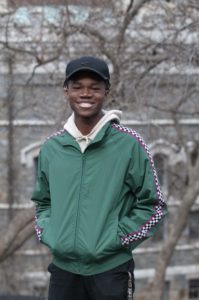
David Owolabi
It was a Friday or Saturday night during the fall of my freshman year, and I was out with some friends, two other men of color.
We were at a party having a good time when a guy stopped us and asked us all if we went to Lehigh.
I didn’t notice him ask anyone else but I thought to myself, “No big deal, maybe that’s just what people say to kids they don’t recognize.”
The first time someone asked me if I went to Lehigh I let it roll off of my back. At that point it was early in my freshman year and I thought it was a harmless question.
Now that I’m a second semester junior, that statement, “Do you go here?” carries a lot more weight.
According to the most recent university statistics, Lehigh’s undergraduate population is 5,047 students. Of those 5,047 students, four percent are black and 63 percent are white. That means that Lehigh has about 3,000 white undergraduates on campus as opposed to just 200 black undergraduates.
Based solely on numbers, it is considerably more likely that a Lehigh undergraduate is white than black.
It is one thing to acknowledge the reality that our school is overwhelmingly white, but it is another thing when we outright assume that a person of color does not go to Lehigh because of that statistic.
My sophomore year, I was again out at a party with two friends who were also black. We were hanging out in the kitchen when we heard a girl mumble to her friend.
“There sure are a lot of DeSales (University) kids here tonight.”
As she walked past us we stared at each other in disbelief. We didn’t want to cause a fuss at the party so we stood there in silence.
She kept walking, and the night continued.
That simple assumption that another student made about my friends and me made me feel like an outsider on my own campus. In these moments, assumptions like this make me question if my school really even accepts me.
The most recent time I got asked if I go to Lehigh was at the end of last semester. I was running around campus taking portraits of students for a project when I decided to ask this girl if I could take her picture.
She asked if I went to Lehigh, and when I told her yes she agreed to let me take her picture. I thought it was odd that she asked where I went to school given the context of our situation. At that time, it was around 10 a.m. on a school day and I had my backpack on. I knew she meant nothing from her question, but at that moment I felt like I was being vetted to see if I was the type of black man who meant her harm or if I was one of the 200 actual Lehigh students that could be trusted.
When I think back to moments like this I don’t tend to get mad, I just feel hurt. In these moments I feel as if I need to prove myself, or pass a test to be seen as a viable member of our community.
As I’ve confronted this question more and more I’ve wondered, do white students get this as much as I do?
I believe that the sad reality is no. Most white students won’t get this question much, if at all. So why don’t we ask white students that we don’t know if they go to Lehigh? Why don’t we assume that they go to a different school? I think we ask these questions because we often don’t think to consider how it affects the person on the receiving end.
When I hear, “Do you go here?” that registers to me as, “You don’t belong. Why are you here?” In a subtle way this question and questions like it make me feel unwelcome at Lehigh.
I am starting this column because I don’t think any of the students who have questioned if I go to Lehigh understood the weight that their words held. This is not meant to vilify white students, but to encourage all of us in the Lehigh community to be more inclusive in our understanding of what it means to look like a Lehigh student.
We as a community need to do more work to make students of diverse backgrounds feel welcome on campus. We all dress, look and think differently, so let’s work to fight our preconceived notions about appearances. I think it could help people a lot if we flipped our mindset and assumed that we’re all students at Lehigh as opposed to the other way around.
Maybe the next time you see a black kid that you haven’t seen around campus ask them what their major is. That’s a better start.





Comment policy
Comments posted to The Brown and White website are reviewed by a moderator before being approved. Incendiary speech or harassing language, including comments targeted at individuals, may be deemed unacceptable and not published. Spam and other soliciting will also be declined.
The Brown and White also reserves the right to not publish entirely anonymous comments.
9 Comments
This is so good! Thank you David, for sharing your pain. We have a lot of work to do.
Excellent article David..proud of you.
Thanks Mrs. Coyne!! That means a lot
Thanks for sharing. What’s your major?
I’m a journalism major
Great work David, this op-ed was a pleasure to read. Thank you sharing about your experiences as a black student at Lehigh, it’s an important narrative that needs to be told.
I do believe Lehigh University needs to do more to attract top AA students.
But…something seemed off in this story so I went to the facts. Is DeSales virtually an HCBU of the Lehigh Valley?
I pulled the ethnicity data from Lehigh’s and DeSales’ most recently available Common Data Sets for Enrollment by Racial/Ethnic Category and their are nearly identical sub 4% Black or African American, non-Hispanic percentages at each university = DeSales has 89 AA students out of 2388 total undergraduate enrollment.
I am not sure how the author jumps to the conclusion that “DeSales students” is code word for AA students given its enrollment rate is almost identical to Lehigh’s. Was the author prejudging the speaker..who he admittedly was overhearing? Logic of the code word seems as weak as Jussie’s case.
https://www.desales.edu/docs/default-source/consumer-information/cds-2016-2017-desales-university.pdf?sfvrsn=86ebf488_2
Go home. Seriously. You’ve done a marvelous job of painting an “I am an overprivileged white man terrified of losing my many, many privileges” sign all over you. Go home now. Maybe apologize first.
You’re intentionally missing the point of the article. It doesn’t matter whether or not the girl making the DeSales comment considered it a virtual “HCBU”; the point is that this scrutiny is disproportionately placed on the shoulders of black and brown students.
I highly recommend you put the same amount of energy you put into nitpicking a frivolous point into trying to understand why someone would feel compelled to write an article about these experiences.